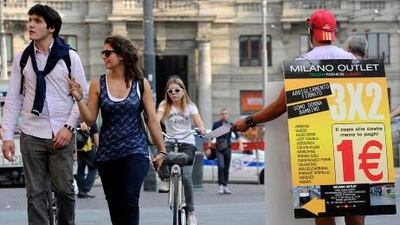MILAN // Dawn breaks to a cacophony of different languages on the overnight train from Berlin to Milan.
Triangle-topped houses of the Swiss Alps flash by the widows of the speeding train as reflections of towering peaks plunge into shimmering lakes.
Videologue:Simmering tensions in Italy
Rory Jones report from Milan on a country struggling with its own economic battle
Watch this video in full screen
As the train pulls into Lucerne, conversations in Italian and German and French all contribute to the sense this train represents
, where border controls hold little meaning.
Later, Swiss and Italian commuters spill out on to the platform at Milan Centrale, rushing to the city's banks, insurance company's and law firms.
Wandering around the busy financial district of Milan, you could be forgiven for thinking the economic crisis engulfing Europe has skirted this northern Italian business hub. The city is busy, clean and most people are in stylish suits, with haute couture in abundance at the end of Milan Fashion Week.
At a small deli called Mandara - a stone's throw from Milan's famous Duomo - Tedeschi Giacinto, 68, is barking orders at his staff as queues of hungry suits wait for their lunch.
Various Italian cheeses, meats, olives and breads can be combined to make what patrons agree is one of the best midday meals in the city.
Once the lunchtime rush is over, Mr Giacinto explains why the current euro crisis doesn't worry him.
"Three to four years ago, there was a crisis, but my business was going up," he says. "I'm not worried about this crisis because of the first one we had."
Last week, he celebrated 39 years owning and running his deli in Milan, having survived booms, busts and the introduction of the euro.
"When we had the change, all the prices went up," he says as he offers a watery chunk of mozzarella. "But it worked out."
The only thing Mr Giacinto could find to complain about was rising retail rents in the heart of Milan and even then he said the business was worth it.
But his optimism, which seems commonplace among Milan's still prosperous small-business community, masks a crisis in Italy, which is drowning under a high level of debt, unpopular austerity measures and an equally unpopular leader in Silvio Berlusconi, the prime minister.
Road to Ruin?: More from Rory Jones reports from the heart of Europe
Greeks seek fortune with paymaster of Europe
Greek immigrants in Berlin seek a better life.
Road to ruin or recovery? Europe's nightmare journey
Europe is on a nightmare journey from one financial crisis to another.
As Mr Giacenti was hurriedly serving customers on Tuesday, Mr Berlusconi posted on his Facebook page that he had met Giulio Tremonti, his finance minister, in Rome and that they were working on boosting Italy's growth. Chiara Menenti, an expert on government debt at Italy's biggest bank, Intesa Sanpaolo, says that since the downgrade by Standard & Poor's on Italian debt, growth and the euro crisis are the biggest problems for the country.
If Italy does not achieve economic growth this year and next, the consequences could be dire, she says.
"A Greek default is a real possibility … and then possibly an Italian default."
Austerity measures proposed by Mr Berlusconi and Mr Tremonti are split - two thirds in higher taxes and one third in lower spending in the country, with the aim to have a balanced budget by 2013.
"We have lost a lot of the economy, because small businesses were unable to survive the [first] crisis," Ms Menenti explains.
Intesa Sanpaolo is headquartered in one of Milan's grandest and most Roman-looking buildings, made of huge blocks of stone.
Ms Menenti says Milan and the many towns in the south of the country present contrasting pictures.
"There's a huge gap [in wealth] between the north and centre, not only the north and south, in terms of public services and infrastructure," she says, explaining why Milan appears prosperous, while the country is on the brink of bankruptcy.
At the city's huge rail station, Stella Colosimo, 30, is waiting to board the high-speed train that travels the almost 500km to Rome in three hours, after which it continues on to Naples.
Ms Colosimo says there is more opportunity for young people in Milan than in the south. She lives with her parents in a Naples suburb called San Sebastiano, which sits in the shadow of Mount Vesuvius.
She is a qualified civil lawyer, but says about 40 per cent of her friends are without work or are on short-term contracts due to corruption in the labour market, a poor education system and low pay by employers.
Ms Colosimo cannot afford her own property. "It's a problem we have until about 35 [years old]. There's no autonomy because we cannot buy a house," she says. "I live with my parents because it's too expensive [not to]."
To train to become a lawyer, Ms Colosimo spent €2,000(Dh10,045) and in five years never once set foot in a courtroom or tribunal. She then had to work for free for two years, shadowing another lawyer.
Ms Colosimo's brother, Felippo, 28, recently moved to Milan to find work on a short-term contract with General Electric. She says a corrupt labour market, where the people you know are more important than your exam results, is stifling creativity.
Ms Menenti agrees. "One of the major things [the government] needs to do is reform the labour market," she says.

